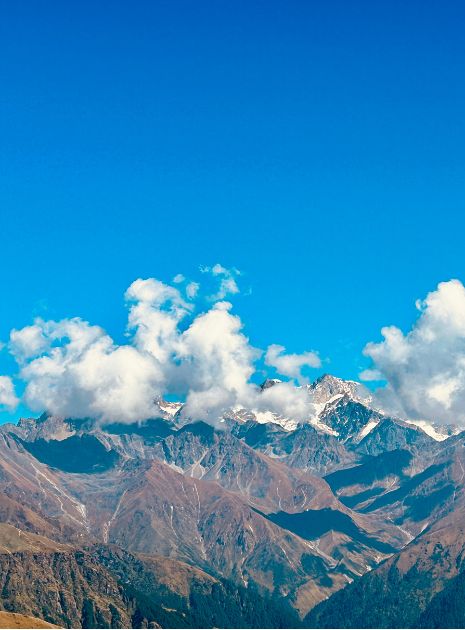Pokhari
If you stroll into Pokhari (पोखरी), it won’t greet you with banners or tourist forums. It simply sits there, quiet in the folds of hills, as though retaining its personal secrets and techniques. A river murmurs someplace far down, fields step cautiously along the slopes, and people move in a rhythm that doesn’t hurry. You might not notice much in the first hour. But if you stay, even for a day, the village begins to open like an old story.
If you stroll into Pokhari (पोखरी), it won’t greet you with banners or tourist forums. It simply sits there, quiet in the folds of hills, as though retaining its personal secrets and techniques. A river murmurs someplace far down, fields step cautiously along the slopes, and people move in a rhythm that doesn’t hurry. You might not notice much in the first hour. But if you stay, even for a day, the village begins to open like an old story.
सुबह (morning) in Pokhari isn’t an event. It drifts in slowly. A cow shifts its rope, a rooster clears its throat, and someone coughs in a courtyard. Thin smoke rises from a चूल्हा (stove), carrying the smell of mandua roti brushed with घी. You’ll hear the splash of पानी in a पीतल का लोटा (brass pot) as children fill it at the नल (tap), shivering in the cold air.
Old men sit in the आँगन (courtyard), hands wrapped around a steel glass of overly sweet चाय, watching mist lift off the ridges. Nobody is rushing. Even the puppies appear half of asleep, wagging their tails lazily earlier than following their proprietors toward the fields.
It feels less like a beginning and more like Life products simply continuing, softly.
The homes right here are very relaxing in summertime, a warm product of पत्थर (stone) stacked with care. The walls keep relaxing in summertime, warm in wintry weather. Downstairs, animals are relaxing. Upstairs, families take a seat in smoke-darkened kitchens wherein the fireplace glows and voices linger.
Step into an आँगन and you’ll see लाल मिर्च (crimson chillies) strung up to dry, मकई की बालियाँ (corn cobs) placed from beams, and a grandmother turning wool on her चरखा. Children draw games with a stick in the dust, pausing only when their mother calls them to fetch लकड़ी (firewood).
If you are a guest, you don’t remain a guest. You’re handed chai, maybe a piece of गुड़ (jaggery), without ceremony. Hospitality is not a gesture here; it is the way of being.
Pokhari’s सीढ़ीदार खेत (terraces) are its memory. Each step cut into the hillside has been walked by countless feet. Mandua, झंगोरा (barnyard millet), आलू, and rajma grow here, not as cash crops but as lifelines.
During बोआई (sowing), men bend with हल (ploughs), oxen pulling steady while women scatter बीज (seeds) with precise movements. They laugh between furrows, shout across terraces, and pause to sip water from a copper lota. Children trail behind, muddy from head to toe, their laughter mixing with the songs of older farmers.
By harvest, the slopes glow golden. Families gather, bundling grain, stacking it with care. It isn’t just food. It is survival, memory, and respect for the soil that raised them.
Here, devotion isn’t loud. You find it under a पीपल का पेड़ wrapped with threads, or at a small stone smeared with sindoor where someone has placed a marigold.
At sunset, a single घंटी (bell) can echo through the entire hamlet. It doesn’t take much. Faith here lives in gestures the diya lit at dusk, the whispered prayer before a meal, the green barley shoots planted indoors for हरेला.
When weddings happen, the stillness breaks. ढोल-दमाऊं beat in rhythm, young men dance, women sing folk songs that sound both joyous and ancient. The sound travels down the valley, as if even the hills are listening.
Pokhari is quiet most days, but on market day, the road fills. Stalls appear, selling salt, masala, woollen टोपी (caps), and small piles of सब्ज़ी (vegetables). The air smells of गरम जलेबी and पकौड़े frying in blackened kadhais.
People don’t come only to buy. They come to talk, to meet cousins, to trade stories. At the tea stall, men lean on benches, sipping slowly, arguing about मौसम (weather), prices of grain, or sometimes politics. Bargains are struck, but always with laughter. For a village this small, a market is less commerce, more reunion.
There’s a school here, painted pale blue, with rooms that echo with children reciting poems. The path to reach it is muddy, but they walk barefoot, carrying slates and bags stitched by hand.
Inside, dreams grow. Some children speak of becoming teachers, others doctors. A few just want to see a town bigger than the valley. Yet, once school ends, they pick up grass bundles, carry water from the stream, and herd goats home. Education and duty walk side by side here, neither forgotten.
Pokhari bends with the seasons.
The village doesn’t resist these changes. It accepts them, lives them.
When you leave Pokhari, you don’t carry souvenirs. You deliver the wonder of chai in a metallic glass, the odor of damp earth after rain, the sight of लाल मिर्च striking towards a stone wall, and the warmth of a person who smiled at you and referred to you as भाई without knowing your name.
Pokhari doesn’t try to impress. It stays with you in quieter ways, like the aftertaste of गुड़, simple and lasting.
| All Sub Districts | ||
|---|---|---|
| Jilasu | Joshimath | Karnaprayag |
| Nandaprayag | Narayan Bagar | Pokhari |

Uttarakhand is not simply another country. People here name it Devbhoomi (देवभूमि), the Land of the Gods. And it feels that way. Rivers begin right he......
See Details